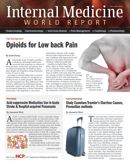Opioids for Low Back Pain
Opioids can be effective in controlling back pain, but their use carries risk of complications, misuse, and abuse. Clinicians have to decide when it is a good idea to prescribe them and when it is not.

Opioids can be effective in controlling back pain, but their use carries risk of complications, misuse, and abuse. Clinicians have to decide when it is a good idea to prescribe them and when it is not.
In an article in the British Medical Journal, Richard Deyo, MD, MPH, and colleagues report on their review of existing literature on the topic. The team’s aims were to examine trends and variations in the use of opioids for back pain, assess their efficacy, summarize new data on the adverse of long-term opioids and offer useful advice to prescribers.
Low back pain is a big problem, with 28% of adults reporting that they had experience such pain lasting at least a day within three months of being surveyed. About half of adults said they had had some back pain in the year prior to the survey.
Recurrence is common, the team found — psychological and social factors could contribute to the pain.
Low back pain is related to serious systemic disease in only 1% of cases, so the authors focused on opioid treatment of patients without underlying serious systemic disease.
There is only low-quality evidence of opioids effectiveness for this pain, yet their use has risen drastically—partly because of marketing efforts by drug makers.
The researchers were frustrated that there were few randomized controlled trials of opioids vs. other drugs, such as NSAIDs, antidepressants, or muscle relaxants.
“Despite modest short term efficacy for chronic pain, it is unclear whether long term opioid therapy has meaningful therapeutic benefits,” they found. There was no shortage of studies on dependency, misuse, and addiction.
“Evidence from a clinical trial for back pain suggests that dependence can emerge with just 1 to 3 months of daily use,” they wrote.
But much of the research led to contradictory findings, with one study showing 26% of patients became dependent on opioids and another showing only 3.7% of patients did so.
The risk of dependency does not prevent doctors from prescribing opioids to patients with a history of substance misuse or mood disorders. Since such patients are usually excluded in random controlled trials of opioid use, it is likely that if they misuse them their behavior is not captured in these studies and thus the dependency estimates are understated.
Looking at observational studies, the team found that while 38% of back pain patients reported less pain after taking opioids, only 16% had improvement in function.
Overdose deaths from opioids are also on the rise, and are directly related to dosage. The danger rises sharply when patients get more than 50 mg to 100 mg a day.
Combing opioids with benzodiazepines greatly increased risk, yet these co-prescriptions are not uncommon.
The researchers looked for effective alternatives and found that exercise therapy and cognitive behavioral therapy seemed to help reduce pain.
Though there are no easy answers for physicians weighing their prescribing options, the researchers said patient should learn “that self-care is the foundation of effective back care” and that it is important to remain physically active. Doctors should also monitor progress by guiding patients in resuming physical activities, not just by tracking their pain.
If patients appear to need more pharmaceutical management of pain, doctors should try NSAIDs, tricyclic antidepressants, and topical analgesics while spelling out opioid risks to patients.
If opioids are prescribed, short durations of use could be more effective than chronic use.
When opioids must be prescribed for the long term, patients should take the lowest dose possible and be carefully monitored for signs of misuse, adverse behaviors, and educated about avoiding concurrent opioids, sedative-hypnotic drugs and alcohol.
“There is no evidence that opioids improve return to work or reduce the use of other treatments,” they wrote.
“One promising [alternative] treatment is to improve access to psychologically informed interventions that support return to meaningful life activities,” they concluded.
